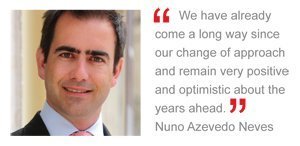The rebirth of ABBC
“All tradition is merely the past,” claimed the renowned writer Jiddu Krishnamurti and this has clearly been one of the core cultural traits among many Portuguese law firms; often founded by charismatic lawyers with a clear set of ideologies but with little thought towards issues such as internationalisation, branding or succession planning.
El cambio de identidad de ABBC en el 2007 fue un reflejo del cambio en el despacho, que se apartaba de su tradicional timidez y lograba afianzarse tanto en el mercado nacional como en el internacional. El año pasado fue testigo de la alianza exclusiva con DLA Piper y la expansión hacia Angola; este año se prevén noticias en Mozambique.
Such a description could certainly have been applied to Lisbon firm ABBC – Azevedo Neves, Benjamim Mendes, Carvalho & Associados Sociedade de Advogados. The firm is celebrating its 30th anniversary but it has only been in the past few years that it has made a concerted effort to fuse tradition with vision, rebranding as ABBC, moving to new offices and seeking greater prominence in both Portuguese and international legal circles. The last year has seen it sign an exclusive alliance with DLA Piper and expand into Angola, and it is now exploring its options in Mozambique.
Name Partners Benjamim Mendes and Nuno Azevedo Neves admit that during the firm’s first two decades of existence, like many of its peers, it tended to go about its business too quietly. But in a rapidly evolving legal market, they began to sense that it was beginning to be overlooked in an environment that was becoming characterised by larger Portuguese and Spanish firms. At the end of 2005, the firm’s partners therefore took the decision to move it in a new direction.
“We decided that we had to re-launch,” says Mendes. “The strategy we decided upon was to increase our level of exposure to the market, to rebrand, to move to new offices, to grow our headcount, and to show our ambition.”
He believes that the firm was probably too shy in the past, but that this can be partly attributed to the general culture of the Portuguese legal market; local bar rules prohibit the naming of clients and advertising, which meant that many firms, even the largest practices, often remained shrouded in secrecy. But the international legal market was diversifying, and Azevedo Neves knew that ABBC needed to improve its communications skills and exposure in order to raise its profile.
By 2006, the biggest firms in Portugal were starting to exceed 100 lawyers. In order to sustain its ambition ABBC therefore needed to grow. At the time, the firm had around 32 lawyers but has since doubled in size. The headcount now stands at seven partners with 52 more lawyers, which although still smaller than its largest rivals, provides the critical mass needed, they say.
The current Partner to lawyer leverage of 1:7 may appear high from an international perspective but it is not uncommon among Portuguese firms, especially when the focus is spent on developing the senior associates’ experience and skills, says Mendes. He believes that relative to other firms in the market, ABBC did not over-expand during Portugal’s boom years. The legacy of which means, that some now have too many Partners and too many support lawyers for the current market reality.
“The trend we have found is for clients to look for value for money; for added value at the lower possible cost,” observes Mendes. “Since the onset of the downturn the leverage has decreased, but the key always is to leverage with experienced high-quality lawyers, not just with junior associates.”
Changing direction
A larger body of lawyers was however only one aspect of the ABBC project. More important, they say, was the need for the firm to increase its exposure in the market. And to do that they needed to move to new offices, rebrand and become more visible.
“Before, most of our work was routine day-to-day matters for clients and domestic transactional work,” says Mendes. “We knew that to increase our presence we needed to focus our attention towards transnational transactional work, which meant expanding into new areas and geographies.”
 ABBC has since grown its capabilities across areas including international corporate/M&A, finance, projects, energy and IP, as well as building on established areas of expertise such as aviation, dispute resolution, employment, real estate and tax. The success of the strategy is demonstrated by the firm’s current client list, they say, and by an increasing profile in the main international directories.
ABBC has since grown its capabilities across areas including international corporate/M&A, finance, projects, energy and IP, as well as building on established areas of expertise such as aviation, dispute resolution, employment, real estate and tax. The success of the strategy is demonstrated by the firm’s current client list, they say, and by an increasing profile in the main international directories.
What is significant is the number of international clients it now services. The ABBC rebrand may have occurred before the start of the global economic meltdown, but tremors were already being felt in the domestic Portuguese market, which helped to reinforce and confirm the need for a strategy already designed towards a more diversified and international practice.
“We realised that the international route was the only way to go,” says Azevedo Neves. “We wanted to find new markets that could offer sustainable projects that might lead to a steady flow of work for the next 20 or 30 years.”
In this respect, the biggest strategic change has however occurred over the last year. Last January saw ABBC take over from Miranda Correia Amendoeira as the Portuguese ally of US-UK giant DLA Piper. The agreement is exclusive – the Miranda deal was non-exclusive – which allows ABBC to plug into DLA Piper’s expansive global office network, to provide a more integrated international service to clients and, on a regional basis, offers an integrated Iberian practice through a single Lisbon contact, they say.
The alliance came in tandem with a partnership agreement with Angolan law firm VCA – Vítor Carvalho & Associados, the country now the focus of ever-greater investment interest by Portuguese and international businesses. The two firms also agreed to share expertise, training and technology.
“The VCA deal is a very important part of the international strategy,” says Mendes. “Angola is a key market for us and it is imperative to have strong links to quality lawyers on the ground. We are very hopeful for the opportunities here and elsewhere in the future.”
Looking ahead
The firm’s evolution has not been without its ups and downs. Ahead of the re-launch it added prominent Partners César Bessa Monteiro and Pedro Cardigos from Abreu & Cardigos (now Abreu Advogados).
The association did not last long, however, with Cardigos departing after only a year to start his own boutique corporate and finance practice. Monteiro – regarded as one of Portugal’s leading IP experts – also left in 2010 with a team and corporate partner Carla Martins Branco to join smaller firm Pedro Pinto Reis & Associados, subsequently rebranded as Pedro Pinto Bessa Monteiro Reis Branco (pbbr).
They acknowledge that the hires did not work out as intended but that ABBC’s bigger strategic picture, which started long before their arrival, had to be pursued and to take precedent over individual uncertainties. The path chosen could not be changed. Despite the departures the firm has not seen a drop in numbers, having continued to add new expertise, including a team led by prominent Lisbon white collar crime specialist, and former President of the Portuguese Bar Association, Rogério Alves.
The two Partners therefore remain optimistic over the next stage of the firm’s development. The DLA Piper agreement allows ABBC to reach out to potential new clients across Europe, Africa, Asia and Latin America and to provide services to Portuguese clients globally, while enabling DLA Piper to reach deeper into the Lusophone markets.
“We’ve just finished our first year with DLA Piper and so are still exploring the full potential of the relationship. The key at present is that we are working extremely well together both at the Iberian and at the global level and generating opportunities for both sides,” says Mendes.
ABBC is also now reviewing partnership opportunities in the other major African market for Portuguese firms, Mozambique. At present it works with a number of different local law firms but is exploring the relative merits of a deeper “best friends” relationship.
Turbulent times
The firm’s major market, like other Portuguese firms, inevitably continues to be the domestic one and both Mendes and Azevedo Neves acknowledge that challenges remain. The Troika bailout and the wider slump in the economy have dented international investor confidence, but have also created new opportunities, which ABBC is now in a stronger position to explore and further develop, they believe.
ABBC has evolved from being a medium size inward-looking firm, with a largely domestic client base, to one of the most international in Portugal. “This year we expect to continue to see consistent growth despite the economic reality,” says Mendes. “There are always new opportunities and challenges.”
The firm’s partners are presently working on the strategic plan for coming years, adds Azevedo Neves. “We have already come a long way since our change of approach and remain very positive and optimistic about the years ahead.”
The firm’s carefully managed growth, a clear strategy and the signing of international alliances – especially with DLA Piper – help provide a more solid platform, he says. Breaking with tradition has never been easy for Portuguese law firms, but ABBC has shown that, with confidence, it is possible to adapt and thrive in an ever-changing market.












